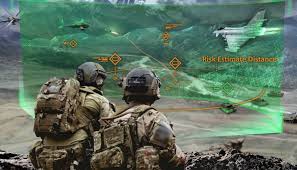VR in Military Training: Stepping into the Heart of the Action
Revolutionizing Training: Preparing Soldiers for the Battlefield

VR in Military Training: Preparing Soldiers with Realistic Simulations for Combat Scenarios.
In the ever-evolving landscape of warfare, where technology plays a pivotal role, the demand for highly trained and adaptable soldiers is paramount. Traditional training methods, while valuable, often fall short in providing the immersive and realistic experiences necessary to prepare soldiers for the complexities of modern combat. Enter Virtual Reality (VR), a technology that is transforming the way soldiers are trained and prepared for the battlefield.
VR technology immerses soldiers in simulated environments that closely mirror real-world combat scenarios. This allows them to experience the sights, sounds, and even the physical sensations of combat in a safe and controlled setting. VR training programs can be tailored to specific military roles, providing realistic simulations of tasks ranging from operating complex weaponry to navigating urban environments.
Revolutionizing Training: Preparing Soldiers for the Battlefield
VR has become an integral part of military training, offering a range of benefits that enhance soldier preparedness and combat effectiveness.
Immersive Experiences: Stepping into the Heart of the Action
VR training programs create highly immersive experiences that transport soldiers to realistic battlefield simulations. They can experience the sights, sounds, and even the physical sensations of combat, fostering a deeper understanding of the challenges they may face in real-world scenarios. This immersion enhances their situational awareness and helps them develop the critical thinking skills needed to make quick and decisive decisions under pressure.
Imagine a soldier navigating a complex urban environment, using VR to rehearse how to identify potential threats, communicate with teammates, and respond to changing situations. This immersive experience allows them to learn and adapt in a safe and controlled environment, building confidence and improving their decision-making abilities.
Beyond the Range: Encountering Realistic Simulations
VR technology allows for the creation of highly realistic simulations that go beyond the limitations of traditional training methods. Soldiers can engage in realistic firefights, practice operating complex weaponry, and even experience the psychological pressures of combat in a safe and controlled environment. These simulations can be customized to reflect specific battlefields and tactical scenarios, providing soldiers with valuable experience in navigating challenging situations.
Imagine a soldier participating in a VR simulation of a night raid, where they must rely on their senses and tactical skills to successfully navigate a complex environment and neutralize threats. This simulation provides them with a realistic experience that they wouldn't be able to get in a traditional training exercise.
Training for the Unexpected: Navigating Complex Combat Scenarios
VR training goes beyond simple drills and simulations, allowing soldiers to navigate complex and unpredictable combat scenarios. It can simulate the chaos and uncertainty of real-world combat, forcing soldiers to make decisions under pressure and adapt to unforeseen situations. This experience helps them develop the resilience, adaptability, and decision-making skills necessary to succeed in high-stakes environments.
Imagine a soldier participating in a VR simulation of a hostage rescue operation, where they must work as a team to negotiate with a hostage-taker and ensure the safety of civilians. This complex scenario requires critical thinking, strategic decision-making, and the ability to adapt to changing circumstances, all of which are critical skills that can be honed through VR training.
From Classroom to Battlefield: Bridging the Gap
VR plays a vital role in bridging the gap between classroom training and real-world combat experiences, preparing soldiers for the challenges they will face on the battlefield. It provides a safe and controlled environment where they can practice essential skills and develop their tactical abilities.
Hands-On Learning: Developing Essential Skills
VR training allows soldiers to practice critical skills in a hands-on manner, enhancing their proficiency and building confidence. They can learn to operate complex weaponry, navigate challenging terrains, and communicate effectively with teammates in a simulated environment. This hands-on experience reinforces their understanding of tactical procedures and prepares them for the demands of combat.
Imagine a soldier participating in a VR simulation of a medical evacuation, where they must learn to administer first aid, communicate with a medical team, and navigate a battlefield to reach an injured comrade. This hands-on experience helps them develop the critical skills and confidence necessary to perform under pressure.
Adapting to Change: Learning in a Dynamic Environment
VR training programs can be customized to reflect the dynamic nature of modern warfare. Soldiers can experience different combat scenarios, encounter evolving threats, and learn to adapt to changing circumstances. This adaptability is crucial in today's battlefields, where situations can change rapidly and unpredictably.
Imagine a soldier participating in a VR simulation of a reconnaissance mission, where they must adapt their tactics based on the information they gather and the changing dynamics of the situation. This experience helps them develop the flexibility and adaptability needed to succeed in unpredictable environments.